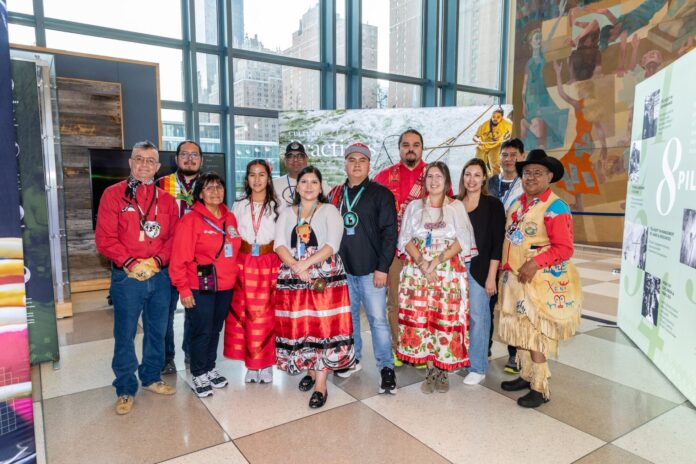A delegation of the Tŝilhqot’in National Government and Xeni Gwet’in First Nation held a panel to call for action in the Toxic Drug Crisis Indigenous peoples are facing in Canada and the region.
Two Chiefs and Youth Ambassadors spoke on a panel at the United Nations Permanent Forum on Indigenous Issues this afternoon [Thursday, April 14].
“The drug crisis is a continuation of threats to our survival”, says Chief Francis Laceese, Vice–Chief of the Tŝilhqot’in National Government. “The statistics will show how many people have passed in our community, but also the B.C level, and right across Canada.”
Last year, the Tŝilhqot’in National Government declared a “State of Local Emergency” due to the increased number of deaths and overdoses from opioids. The state of emergency was issued across all six Indigenous communities.
“We feel that it[the message] was heard, but I feel we were also set back,” says Jenny Philbrick, Executive Director of the Tŝilhqot’in National Government. Philbrick attributes some setbacks to the B.C and the ongoing federal elections.
“We’ll be over the election next week, and we can dig in with our partners and come to the table and come up with solutions.”
Alongside Laceese and Philbrick were Youth Ambassadors Dakota Diablo and Sierra William, and Chief Roger William of the Xeni Gwet’in First Nation.
Diablo and William spoke on how the toxic drug crisis has affected Inidgenous communities not only on a communial level, but also individually. Diablo brought up how the systemic racism in Canadian policing and health care has created feelings of threat not protection in Indigenous peoples. Diablo asks that the federal and provincial governments of Canada take action and to “immediately recognize Indigenous policies and and policing as essential services.”
William spoke on the trauma and spiritual harm that is still felt in Indigenous communities from Residential Schools and smallpox epidemics. William calls for the governments to allow more funding to build sustainable aboriginal healing centres that “will address the physcial, mental, emotional, and spiritual harms” done to the Indiegnous, and will help them reconnect with their lost culture.
“We want to make decisions for our own people, and have a voice at table dealing with the toxic drug crisis,” says Chief Roger William of the Xeni Gwet’in. “We call on Canada, the province of B.C, to support the First Nation communities with resources needed to deal with these issues in our own ways.”
Chief William adds these resources could come in with “on the land treatment processes and centres”, funding to support the relearning of Indigenous culture and language. All ways for the Indigenous communities to access health care and detox services away from spaces that Indigenous peoples are still being discriminated in.
Housing developments within Indigenous communities were also on Chief William’s list of resource needs.
“Lastly, we want to recognize all those that have lost loved ones to the toxic drug crisis, and be allowed in our ways to remember them.”
Jenny Philbrick, gave a final message for this call to action to bring together all communities suffering the toxic drug crisis.
“We know that we’re not the only indigenous community that has declared a local state of emergency. We want to work with all of our partners andsee what’s working and not working in their communities. We know we work better together in numbers. That’s why we’re here today, to get our message out there and get other people to join us in this way of moving forward in a good way.”
Something going on in the Cariboo you think people should know about?
Send us a news tip by emailing [email protected].








